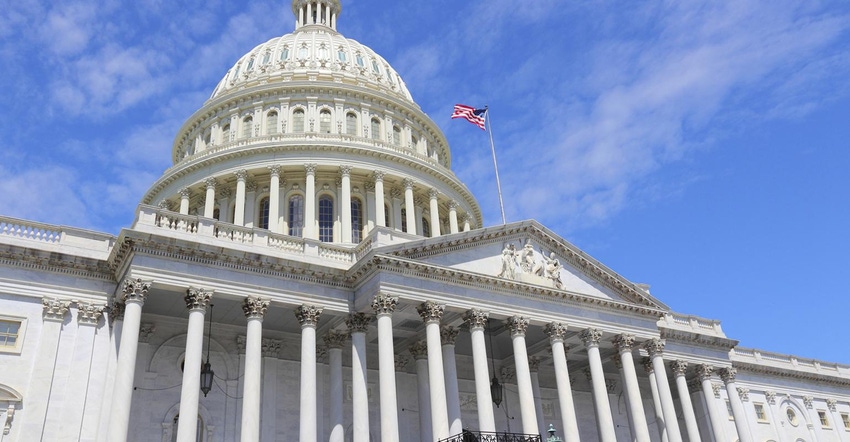Bill proposes a 10% increase from Fiscal Year 2021 with increased funds for confronting the climate crisis and rural broadband.

The House Appropriations Committee advanced their agriculture appropriations funding bill for Fiscal Year 2022 Wednesday, which was marked up and approved by the Agriculture Subcommittee last week. The agriculture appropriations bill plays a major role in shaping our food and farm systems as it funds many major programs and functions of USDA. For FY 2022, the bill proposes a total of $26.55 billion, a more than 10% increase from FY 2021.
In total, the bill includes $196.7 billion for both discretionary programs funded on an annual basis and mandatory programs. The bill provides significant funding for climate-related issues, $347.4 million, and expanding rural broadband, $907 million.
The $347.4 million to address the impacts of climate change are aimed to tackle the climate crisis in farming and rural communities and include research to monitor, measure, and mitigate climate change, accelerate climate smart agriculture practices, reduce greenhouse gases and advance clean energy technologies.
“The House bill includes historic wins for sustainable agriculture priorities,” says Eric Deeble, National Sustainable Agriculture Coalition policy director. “NSAC applauds House appropriators for advancing comprehensive investments in rural communities, sustainable agriculture research, and local and regional food systems.”
The legislation includes a substantial increase in investments for the Sustainable Agriculture Research and Education program at $50 million, a $10 million increase from FY21. This funding level will allow SARE’s farmer-driven research to keep pace with the growing challenges farmers face in remaining profitable and viable in the context of climate change.
The International Dairy Foods Association President and CEO Michael Dykes says he is pleased to see the House appropriations bill include important provisions that encourage milk consumption amongst school children and adults, find sustainable solutions for ice cream byproducts, and provide support to the FDA to modernize its outdated standards of identity for dairy products.
“Importantly, this bill would triple current funding for the Healthy Fluid Milk Incentive Projects—a pilot program that incentivizes SNAP beneficiaries to purchase fluid milk, making it easier for families to get more of the nutritional benefits of milk. It would also extend flexibilities for schools to continue to offer low-fat flavored milk—a nutrient-dense food that provides children with the health benefits they need as they grow—during the upcoming school year,” Dykes says.
The bill also provides investments to ensure equitable participation in USDA programs, according to a summary from the subcommittee. In total, the bill provides more funding than the request to advance racial justice, including increases for extension, research, and capacity grants at 1890 land grants, 1994 land grants, and Hispanic serving institutions to help strengthen the pipeline for the future of agriculture. It also provides funding to improve outreach and program access to historically underserved communities and provides a healthy increase for USDA’s Office of Civil Rights above the request.
NSAC supports the considerable allocation to build resiliency by investing in local and regional food systems. This includes $21.4 million in discretionary funding for the Local Agriculture Market Program, building on the $100 million in emergency funding allocated in the December COVID aid package, along with the $50 million in yearly mandatory farm bill funding.
NSAC also commends the $2 million allocated to the Agricultural Marketing Service for a new Small Meat Packing Plants Apprenticeship program. Given the increasing demand for local or regional sustainable meat and poultry, and the challenges faced by small- and medium-sized meatpacking operations during the pandemic, this funding aims to bolster workforce development for smaller meatpackers and foster partnerships with existing institutions and organizations with expertise in meatpacking operations, NSAC notes. Reps. Chellie Pingree, D-Maine, and Agriculture Appropriations subcommittee ranking member Jeff Fortenberry, R-Neb., introduced this provision through the Strengthening Local Processing Act and providing funding for it through the FY22 bill.
An amendment for China
Rep. Dan Newhouse, R-Wash., introduced an amendment to the appropriations bill to prohibit the purchase of agricultural land by the People’s Republic of China and make agricultural lands currently owned by the People’s Republic of China ineligible for farm programs.
A 2018 report from USDA’s Economic Research Service has found that Chinese investment in the agricultural sector has grown tenfold in the last decade. A 1978 federal law, known as the Agricultural Foreign Investment Disclosure Act, requires foreign entities to report transactions of farmland to the USDA’s Farm Service Agency. The data covers years 1900 through 2016.
It is not clear what the timeline will be on final passage, and whether it will be included in a minibus or omnibus bill as often done in the past.
“We hope Congress will expeditiously move forward with the appropriations process and avoid passing a Continuing Resolution, so that these significant increases in the House bill can be enacted as soon as possible to provide much-needed support to farmers, researchers, and organizations. Making these crucial investments now is key to recovering from the pandemic’s impacts and building a resilient rural economy, bolstering sustainable food systems, and addressing the climate crisis,” says Deeble.
About the Author(s)
You May Also Like



.png?width=300&auto=webp&quality=80&disable=upscale)

